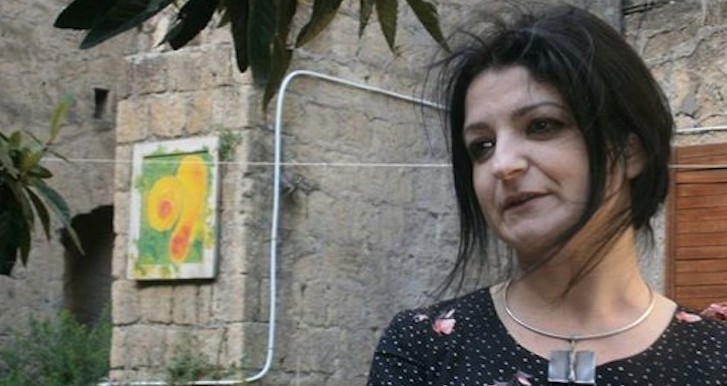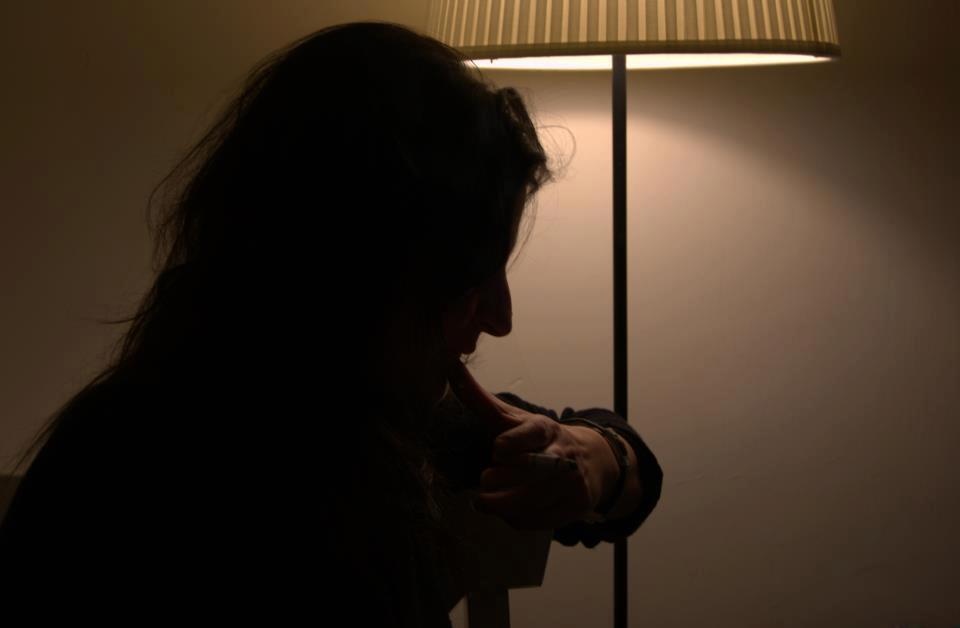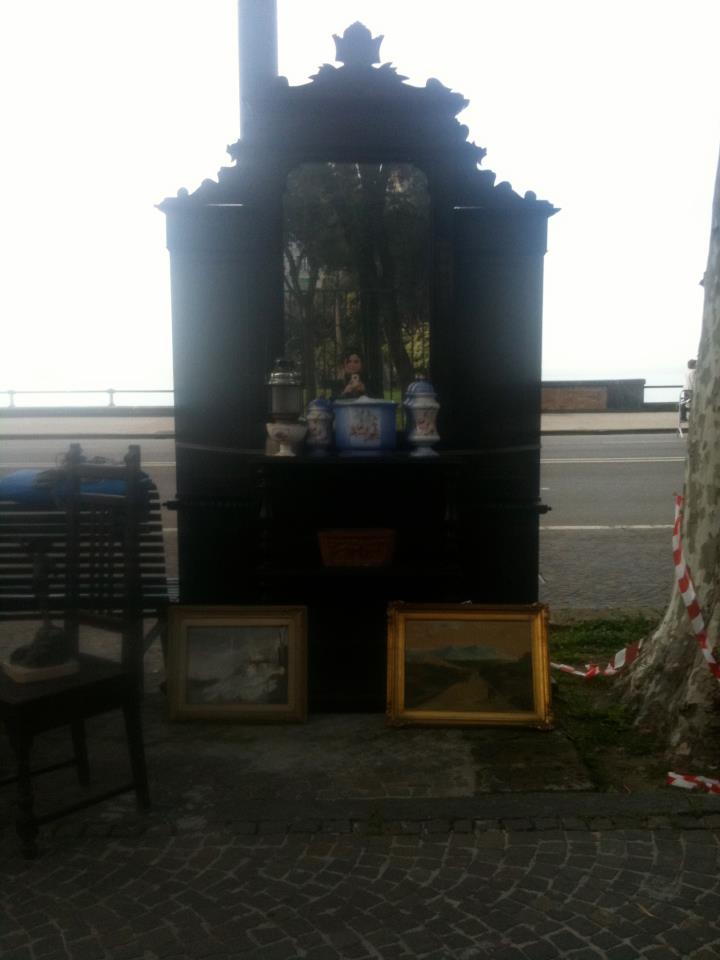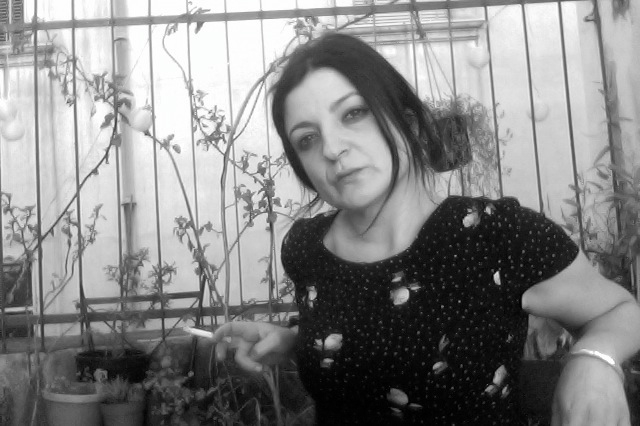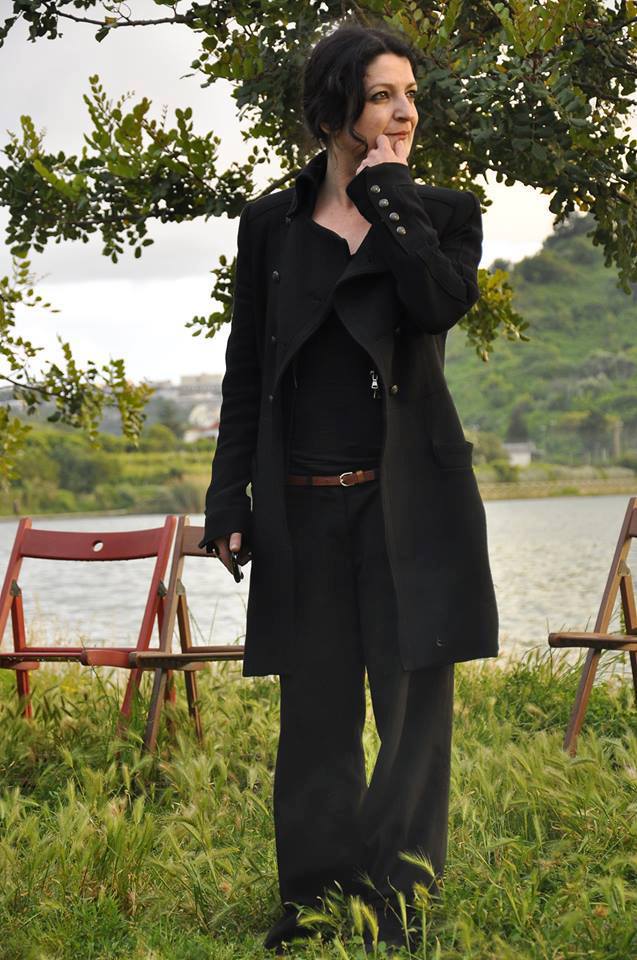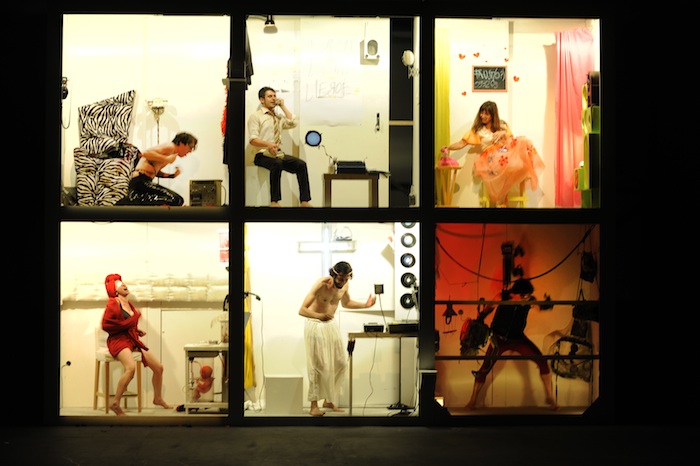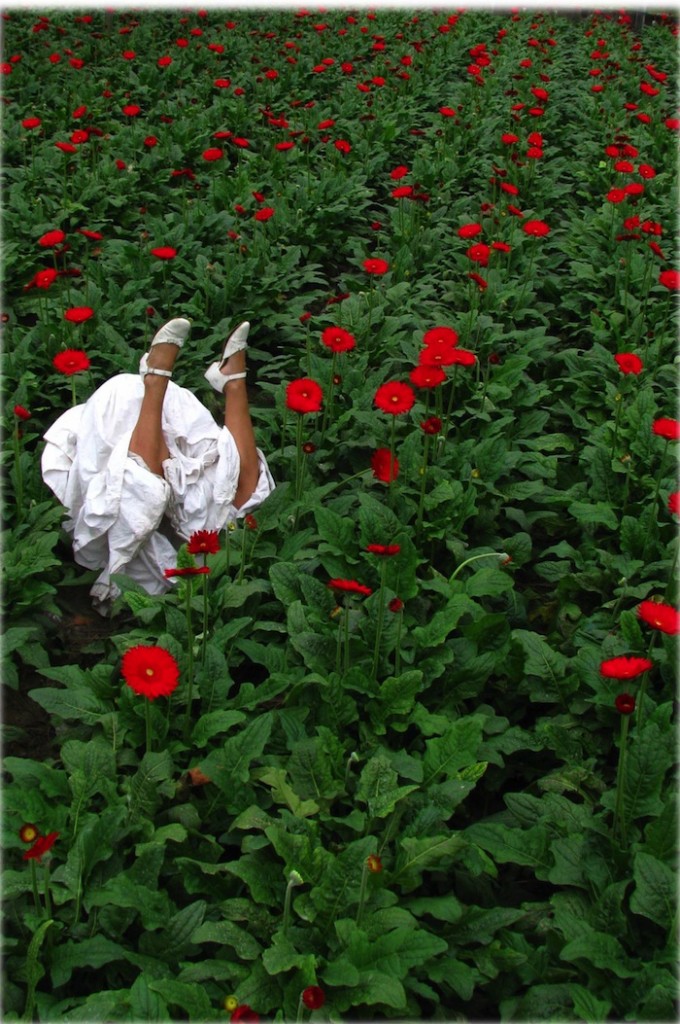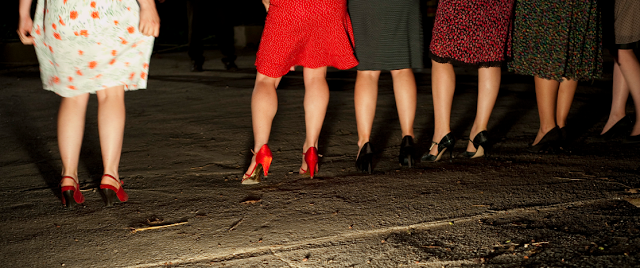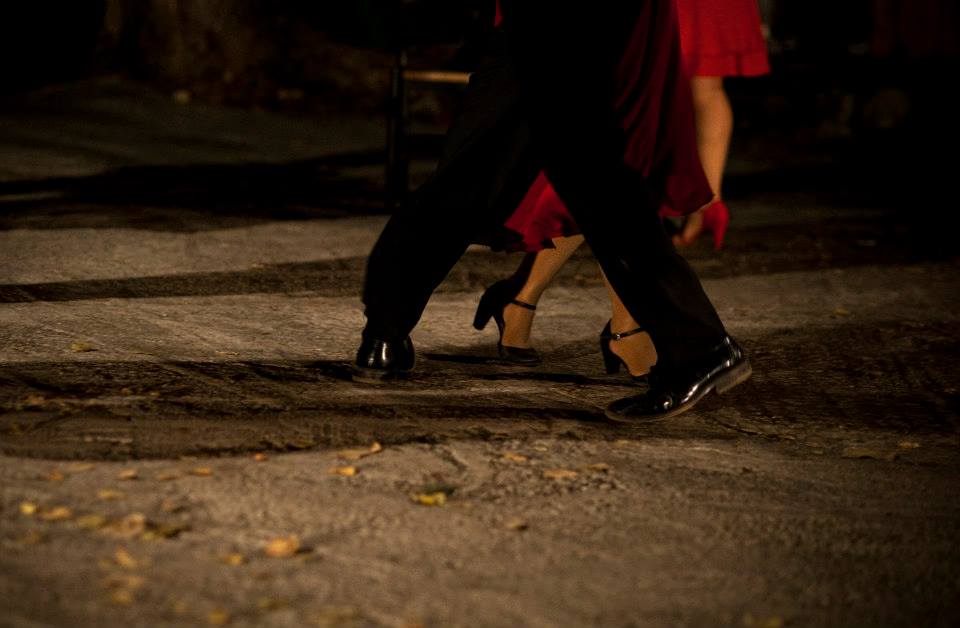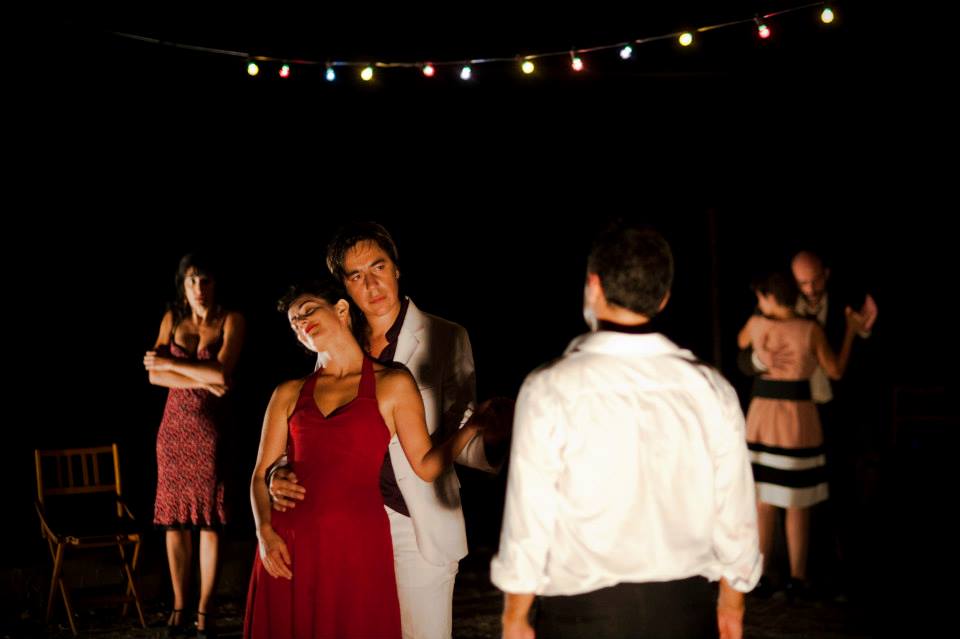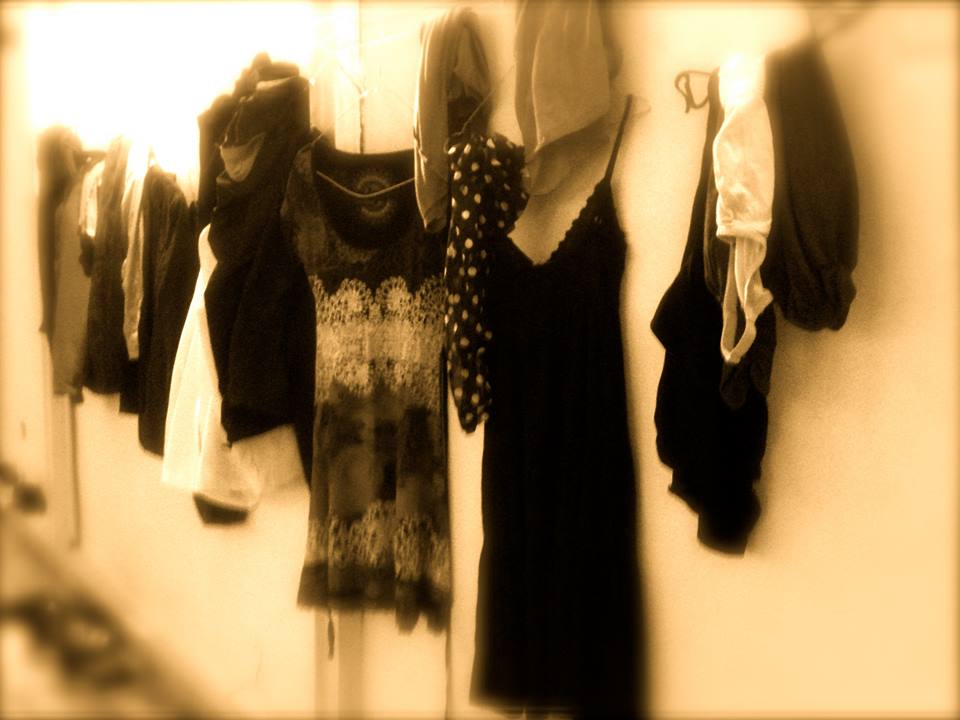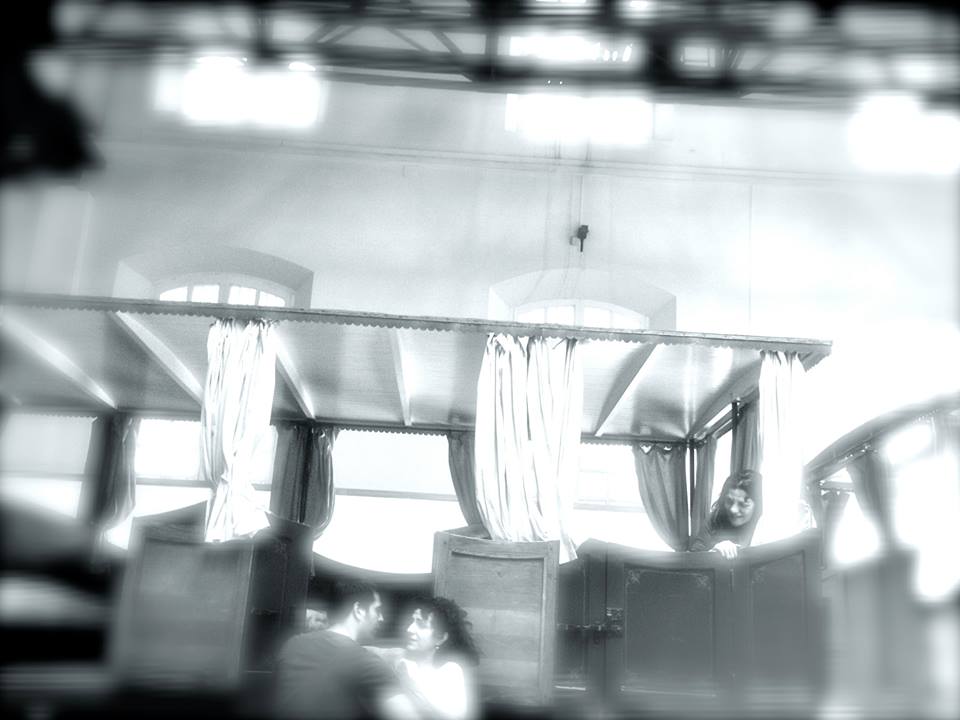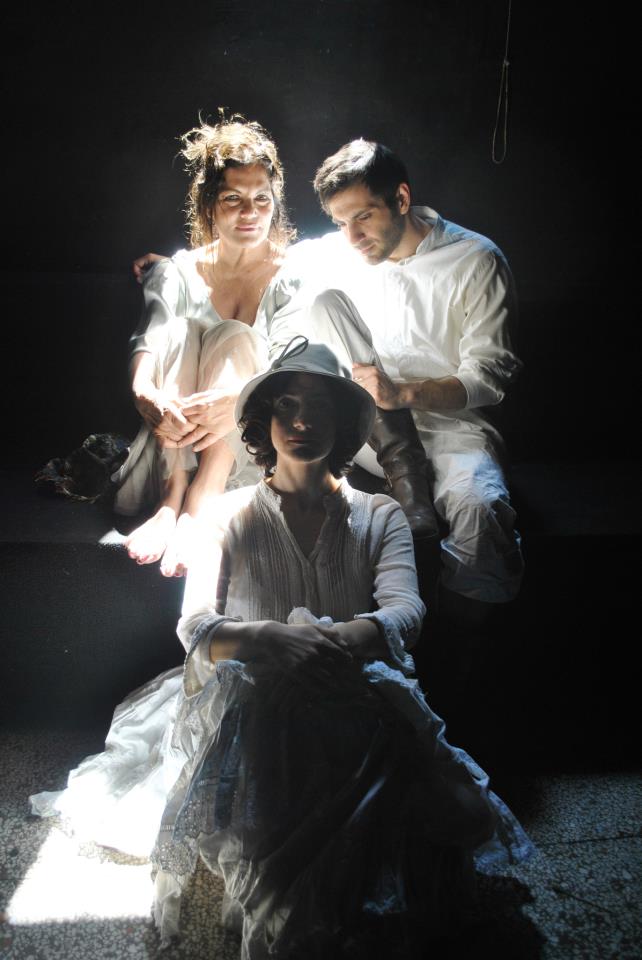Her dictionary – the visual, the tactile and the sonic – is a dictionary of dreams. It is so perfect and in the main time so able in translating modernity – adherent to reality that she from time to time choses, designs and sections in vitro to let it work in her pièces – that is resistant to any definition, except the pure magic. Sara Sole Notarbartolo perfectly fits in my beloved definition of worlds inventors: she is the first at the moment, she not only creates an apparatus but a small planet full of everything, from which she enters and exits – this planet is only subjected to a duration, the time of the show, but apart from this the imposed rules are coherent and remain attached to you so that when it finishes you find yourself asking for more and more and more. Sara’s worlds are always fresh, even if pertaining to 1920: they are perfect, the truest, heart rending and witty, sweet as molasses and tragic, irreverent and chic at the same time.
Made with virtually nothing, produced with small budgets but with an incredible talent and an indefensible willpower in the mare magnum of the disaster of Italian contemporary theatre and in particular the one in Naples. Indefensible because this theatre and this country would not be deserving her and she would have to stop to insist, she should have, rather, prepared a sack and fly higher, farer, apart, to go to se what there is a bit more là bas (as a very sharp old lady, who I met before she died, used to tell me before she left, 90 years old). I must be more clear. Sara Sole is a tireless traveller, the roadrunner in exploring places and cities, bodies and resistance, privation and limits. I only want to say that she should leave Naples, or at least to alternate her Neapolitan permanence with six months spent somewhere else, not inevitably by pushing herself onto the other hemisphere.
I met Sara twenty years ago when – we all were 20 or something – a friend of mine, Giorgio Anastasia got her introduced in an editorial board of a flamboyant fanzine (at those times duplicated and not printed) we designed and produced. Just barely we never got lost and we often did something together even if different cities, lovers, the frantic run of the everyday lives kept us apart. Each time we can, we meet and it is like a fantastic clic as the worlds she designs and makes real on stage. Off the cloudy, wishy-washy world, the real one, the one we live in. Haven’t you ever heard of her? Have you already seen some of her theatre pieces? Sueno, the last debut (in world exclusive at Napoli Teatro Festival 2013, in which, among the others, Cristina Donadio was acting), has been on stage surrounded by the old locomotives of the best European trains museum (Pietrarsa): a triptyque of characters whose historical and emotive identity seems to have been closed up in a not completely definite condition, they seem dazed and confused as if they had lost a clue, a gesture, a sure evidence of being in Time. It is, maybe, Sole’s theatre at its highest levels. Faust is the story of a 35 years old man who is a precarious worker in a city where just being in the streets is dangerous. In the building where he lives, there is also home for an independent radio ruled by Jesus Christ. Margherita, Mefistofile, Belzebù and the same Lucifer are all Faust’s neighbours and are designing the end of the world behind his back. Faust seems to sum our lives in such perverted and mitopoietici places as Naples, Marseille and the Balkans. Mulini a Vento is a remarkable dose of Cervantes in an abundant Neapolitan spirit. It is like a ‘not-evil’ antidote to Sara’s childhood. Two grandparents tell a lot of tales to a girl by hoping to let her exit from the wardrobe in which she has locked herself. “Then the plot opens up and becomes bodies, sketches, horses, assassins, miracles, resurrections, apparitions, returns, prodigies, exiles, songs, wickedness, magic places under the fascination of sugar, death rehearsals, love rehearsals, seduction attempts, resistance trials, fears, fears, even bigger fears until that when the terror arrives, death will be a small thing in comparison. Mulini a Vento is a pièce on marvel and gratitude, it is adventurous, musical, joyful and painful as memory.”
Then my favourite one, La Tentazione. We are in the year 1919, a young girl is blooming. I mean that she is not only a teenager who prospers (from an age to another), she perspires flowers and she does it being incapable to stop. She inundates, invades, embeds and kills with her scent: a village, a mentality, the grey of the history and of the stories of a South Italy always too grim and full of shame. She, with her flowers, spreads a tragic and dulling marvel on everything. She sweats beauty. At a point, few days ago, I wrote to Sara. I could have called her but writing is our sacred dimension as some writings.
Here we are with a few questions, we could say a stable step to start to tell about each other and especially about you. Minimal women[1], the Cerriglio, some places in which to start, our kick start has been the madness to be born in Naples, to write and design culture in alternative spaces when this was not yet fashionable and…all the rest is only boredom, as the Califfo[2] could say. To remain all the time turgid and above all with high spirits, we have challenged everything and its contrary. Can you tell me how did you build a reputation in the Italian theatrical scene, how do you avoid mistakes in men or men who are mistakes, to fund your theatre, to still create incredible pieces in which you mix poetry and delirium, reality and history by creating places and circumstances (one above the others, a young lady sweating flowers) with the aesthetics and the best sound design I saw around? If you had not been a writer and a visionary one, what route would you have followed?
I do not know. I never skip unsuitable men, funds are always disappearing and if I find them, they are always not enough, not having ‘protectors’ makes my life hellish (although I am proud of it). There is no rational explanation. I do not believe that I have become crazy, I think on the contrary I have put my fury at work. I am a permanent worker of the evil I have in my mind, and this is good.
In this run out and in this unkind city, sometimes there has been somebody that looked toward me and saw (crazy him/her) something good. This happened a long time ago, during the Cerriglio times and since the first anarchist-irrational publications we produced.
Hillman speakes about the “oak-like of the acorn”, a hard factits nature finding its path doesn’t matter the obstacles, only thanks the oak-like of each acorn. I think all this saved me and saved all of us. If I had not become a writer? Would I have banally died or entered in a mental hospital? Would I have been happy? I do not know if happiness will save us or if we are searching happiness. Maybe pain will save us because it activates us and lets us escape or react, it allows us to go around, to find exits, outputs or capitulations for it, it is like a dance it is impossible to say. One of the works I am writing now is called VAS and is on impossibility in communication. VAS stands for the pain sizing index and in Neapolitan dialect it sounds as “kisses”. I am at the first lines of VAS and I already suffer: this is good.
Can you tell me more about Fringe and Teatro Festival Italia (Naples), if you can and if you like, being fully sincere?
I debuted at Fringe four years ago and it was the year in which this section opened up. Then, from the following years I have always debuted at the official program of Napoli Teatro festival together with Peter Brook and all those big names of the world theatre scene. This is very good, especially for a drama director and writer like me and given that in Italy the drama industry, as we could call it, “is stuck”. This obviously also means having all the troubles of a small director among the most famous around. The national press and the industry are always elsewhere and is impossible to receive the necessary attention for the debut. It has always been a small war and I always struggled with all the possible weapons. I cannot fully describe it to you, I have only a long list of names and images: hammers, nails, flowers, songbirds, tears, throwing chairs, blackouts in the middle of the general rehearsal open to the public, a lot of smiles, black paint, cuba libre, memory memory memory, conviction house, all the men of the world, trains, dates, dreams, storms, drawing checks far in the date, Kosovan beautiful interns all around, the beauty of 50 minutes against the ugliness of the world, audience crying and smiling – the oblique face of somebody at the last seat with a tear rolling on at the end – and the energy of an incredible company (an army, a sort of army of the joy).
How much did you spend for your lastest pièce? What would the costs been in Paris or in Milan (just to mention a few scenes) and which theatres are you dreaming to work with – with the exception of Asilo Filangieri[3] and Mercadante?
Costs were similar to cost for a monologue, but even less. And we were in 12. Then the theatre cut us 20% of the budget at the very last minute when we had already agreed on the artists’ fees, so we found ourselves with nothing for the scene design. Quite honestly: the design set (everything: from the equipment to the scenes and all the rest apart the costume design) has been done with 500 Euros and with the good will of every of us.
The former Asilo Filanegeri, la Balena, is a kind of paradise of possibilities and gives all that it can but funds which have to be found elsewhere and that is ok.
I would dream La Friche (Marseille) where I worked two summers ago and was such a beautiful artists factory that I would never depart from; the Theatre de la Ville, Paris, where they put on stage one of my dramas (where I was not directing, but a very talented director signed it, David Lescot, I have been very honoured that my drama has been put on stage by him) and I was asking to myself “Why they did not let me be the director? Why I never asked for it? Why am I not moving in Paris? Yes, I would dream a stronger structure taking care of myself, of my work, a theatre I’d like to belong to and where I could find complete trust and be considered only as an artist. I have been assisted by many production units in these years but always under the name of one company, Taverna Est Teatro, which means to have other responsibilities. I would love to do only what I am able to do better: to write, to direct, to work with other artists; on the contrary, in these years I had to deal with everything or to coordinate everything (press office, promotion, administration) and these are not jobs for me, these are only working hours stolen from my life – and furthermore, I do it bad. How can I change this?
This past year I directed five shows, I wrote 5 original dramas (all here in Naples: Teatro Nuovo, Bellini, Galleria Toledo, Mercadante and Napoli Teatro Festival), each time all shows have been sold out, the theatre was always full, people standing out. Well, even given this, I do not have producers in line out of my door asking to work with me.
I could say that this is also because of the “fear of the pussy” that many suffer, which pairs very well with the lack of the famous “protector”.
Now I am working again without a structure giving me full freedom. For instance, I have recently finished without any support, La danse des Amantes * with 12 actors-dancers. The result has been so strong that we decided to let it go on, by selling it in non-conventional spaces as in the countryside, festivals, small province villages, dance halls…we had such a strong audience and press reaction that we have already received some proposals because it is a performance-event, made by incredible actors. It is great because it ends with a party and the audience is invited to join, to dance, even until sunrise. It is an action of joy, and joy has a revolutionary status that is higher than us.
Apology of a crime, ops, make the apology of theatre critics in Italy: what to transplant in his/her mind first (the brain does not count)?
Some critics would love to do more but the editors do not let them. Sometimes they could do more but they do not give a shit.
There are critics who consider you only when there is another one, more established and powerful, who did it first.
Those who come to review you only because in that period you’re trendy.
Those coming because they like your pieces.
Those not coming because you are not a boy to fuck.
Those writing of you only by letting you passing the mark but after that they recommend your name for a very important international event “because I know you’re good”.
They are human with all the best qualities.
Answering a question “why did you never go to see a Sarasole Nortarbartolo’s pièce, a critic said (was he joking?) “I do not know, I do not like the surname”.
It would have been a job for heroes and of heroes, and there are very few of them (but there still are some).
What has been your favorite workshop?
Among all the ones I held, the unforgettable has been the one at Misilmeri, a small village close to Palermo. I was writing La Tentazione (it’s about the story of that young girl who has the miracle to expel flowers) and also looking for actors. We were working with my actors and others all together to make miracles in the village. We were waking up at the sunrise, we were knitting apples to trees that were not for fruits; we were filling fountains with flowers, we were playing serenades, we were putting signs informing of cancelled marriages, we were making a procession all around the village. It was our festival, and a festival for the curiosity of the inhabitants. Out of that workshop a lot of perfect sets for the pièce were born.
The best one I attended has been in Volterra, entitled “According to Pasolini” and held by Le Ariette company: saying that it changed my life is not enough. We were working to build some carts and then we were going around the small streets of Volterra by stopping and performing actions, speaking with people, reading text of Pasolini and then we were leaving again. They were magic and at the end, after all the wanderings, we reached a hill and planted crosses and on these crosses a screen showing some of Pasolini’s movies. On the evenings, it was foggy even if it was in July, the movie “Il Vangelo Secondo Matteo” has been so touching for all the public that at a point I remember Stefano – one of the more laical actors (from the Region of Emilia and from Le Ariette Company): he was running to switch off all the suspended bulbs on the grass, to show the sorrow during the scene of the death of Christ.
And now a twist of intimacy: how many houses have you changed? How many theatres have you used? How many playscripts have you written and how many would you have written? Who will have you at the end? Always Naples?
I was living in a house in which sun never entered and we were having a neon switched on night and day, I had a house as a nutshell in which one night we slept in twenty, I had a house full of phantoms where I could not stay alone, many too many houses-camorra surrounded by the ugly and the evil, I had house-shelters of friends who saved my life, from which I could see domes. Maybe I had 15, maybe 20, 30 houses. The actual one is the best, you can see sea and domes, but quite often the roof is menacing to fall down. Theatres? A lot. There is one in Trieste where the sea can enter under the stage; there is one, in Umbria I guess, that looks beautiful until you discover that the stage is triangular; there is one in Mostar still having shot holes in the walls; there is Valle Occupato in Rome that is so fantastic that I could not believe it and I cannot remember the second act of my pièce because I was drunk because of sadness. I do not know how many theatres, maybe still too few. I cannot count the scripts, it would be as counting boyfriends, something that should not be done. I feel I have written all that I wanted to. Sometimes I would have done it better if I only had more time. I had also a husband for seven years, he did not let me write. In order to do so, I had to hide – I’ll turn 40 and I have to recover a lot of things. At the end who will possess me? I do not have the answer and this also frightens me a bit.
We’ve published a fresh Sara’s short story (Camilla Suarez) here
*La danse des amants is among the original pièces which won the residence at Cantieri Campsirago Residenze and will debut on June 29 in the abandoned city of Consonno, Brianza, Lombardy Region, within the frame of Festival Il Giardino delle Esperidi. Taverna Est Teatro opened a crowdfunding campaign for it.
[1] Minimal women is the mimic of a small collection of stories with a similar title that Sara Sole edited for Edizioni Il Cerriglio, the first place in which we acted as cultural agit-props in the 90s. She was leading a theatre workshop and I was leading a poetry one; we also had helped the boys of the poor district in which Il Cerriglio was based to do their homework.
[2] Califfo is the nickname of a famous singer from Rome, Franco Califano and “tutto il resto è noia” is one of his more celebrated verses among his songs.
[3] Asilo Filangieri is an empty municipal Building that would have been serving as a Culture Forum. Some theatre workers and artists took over it by placing one of the most fascinating performance stage, following the lines of Teatro Valle Occupato in Rome. Mercadante is a public theatre in Naples.
